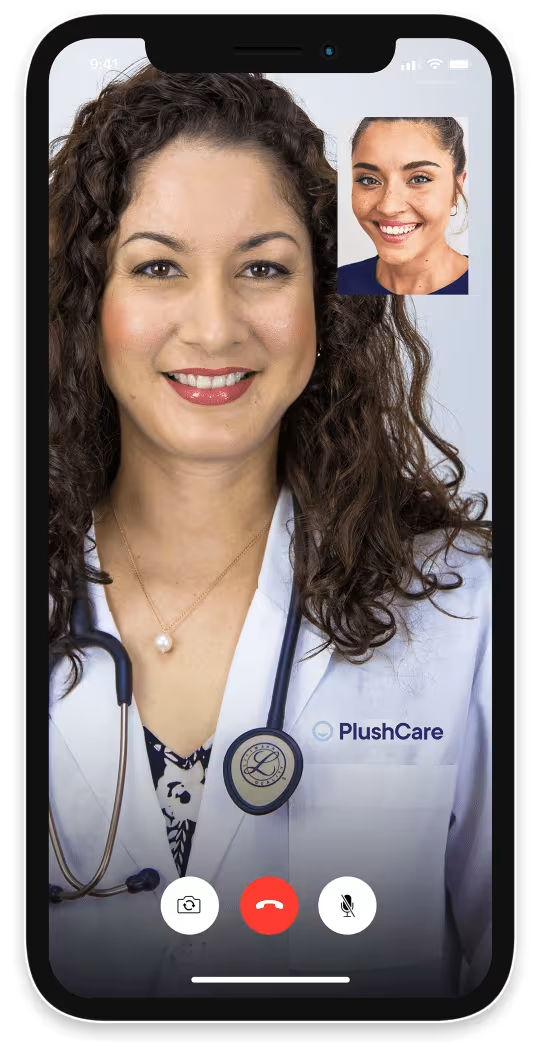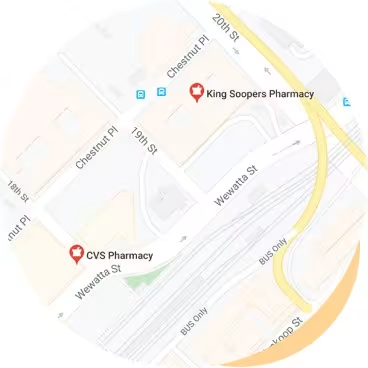- Chronic Care
Insomnia
Insomnia medication and treatment online: consult with a top doctor today
Discover relief from insomnia through an online consultation with our board-certified doctors, who can prescribe or refill sleep medications. Learn about the benefits of prescription sleeping pills and take the first step towards a restful night's sleep.*
Book an appointmentBook online for insomnia help and sleeping pills*
Long-term options for chronic sleep problems
Tailored prescriptions for specific sleep issues
*Please note that our doctors cannot prescribe controlled substances like Xanax, Ambien, Lunesta, Belsomra, Valium, Klonopin, Ativan, and lorazepam. However, our doctors can prescribe other sleep aids to help with insomnia treatment. Prescriptions are provided at the doctor’s discretion. Learn more about our controlled substances policy and how to save up to 80% with our prescription discount card.

Insomnia treatment
Several treatment options are available for acute and chronic insomnia, including:
Prescription sleeping pills: If you experience significant insomnia symptoms, your doctor may prescribe sleep medicine to minimize sleep disturbances. Medications can improve sleep quality, reduce anxiety, and decrease daytime sleepiness.
Education: If you have acute insomnia, your doctor may provide information about insomnia to help you identify any stressors that may have triggered your sleep problems.
Psychological and behavioral interventions: Cognitive behavioral therapy (CBT) is the preferred treatment for chronic insomnia disorder. CBT can help you manage anxiety, practice healthy sleep hygiene, and improve sleep quality without sleeping pills. Research consistently shows that cognitive behavioral therapy for insomnia is an effective treatment option.
Healthy sleep habits: Healthy sleep habits can help promote sound sleep if you have insomnia. Natural ways to minimize insomnia include:
Follow the same bedtime and waketime each day, including weekends.
Exercise regularly.
Limit naps during the day.
Avoid caffeine, alcohol, and nicotine, especially before bedtime.
Avoid large meals and beverages before bedtime.
Make your bedroom comfortable for sleep.
Create a relaxing bedtime routine, such as taking a warm bath, avoiding screen time, and turning the lights down.
Insomnia medication
If insomnia symptoms affect your quality of life, your doctor may recommend over-the-counter or prescription sleep medicine to improve your sleep quality.*
Since there are different kinds of sleeping pills on the market, it is essential to note that they work in various ways. Sleeping pills often help due to their sedative effects, allowing you to fall asleep quicker. Some may also improve your sleep quality.
Most sleeping pills are only for the short-term treatment of insomnia. You may be advised to stop taking sleeping pills after a few weeks. This also accounts for many of the OTC sleep aids that are available. Long-term solutions in terms of sleep medicine usually look at the underlying causes of your insomnia.
Some common prescription sleeping pills include:
Antidepressants
Amitriptyline and other antidepressants are commonly prescribed to treat insomnia, especially in people with depression. While it can take several weeks for its full effects to be felt, many people who have used amitriptyline report feeling more relaxed and able to get better sleep. Trazodone can help you fall asleep and stay asleep throughout the night without feeling sleepy during the day. Mirtazapine can help reduce the duration of early, light stages of sleep so you can enjoy deeper sleep. Doxepin is generally considered safe for short-term use and may be prescribed to help you fall asleep faster, stay asleep longer, or both.
Others
Certain antipsychotic medications, such as Seroquel (quetiapine) and risperidone, can effectively treat insomnia. They can help you fall asleep faster, improve sleep quality, and reduce nighttime awakenings. Hydroxyzine is not usually a first-line treatment for insomnia due to the potential for side effects. However, if other medications have failed to treat your insomnia, you may benefit from hydroxyzine.
*Please note that our doctors cannot prescribe controlled substances for insomnia, including Xanax, Ambien, Lunesta, Belsomra, Valium, Klonopin, Ativan, and lorazepam.
Your doctor will tell you how to take your prescription sleeping pills. It is essential to discuss any potential side effects with your doctor before taking any of these medications and to follow their advice on dosage and how to take them.Sleeping pills usually work quickly, which is why you should take them just before you go to bed. In most cases, you should experience the effects within 30 minutes to an hour.
Taking sleeping pills on an empty stomach is usually a good idea. Eating food with the medication may cause heartburn and indigestion.
Do not take sleeping pills before you drive or perform other tasks that require alertness.
Be careful with certain types of sleep medicines if you have a history of drug dependence. These prescription drugs may cause a recurrence of your addictions. This can lead to dependence and even worsen the sleep difficulties you already experience.
Do not take antidepressant sleeping pills if you already use medication to treat depression, unless you have discussed this with your doctor first.
You should avoid using other medications that also have sedative effects.
Avoid drinking caffeine or other substances that can keep you awake too close to your sleeping pill dose. This can affect your ability to get a full night's sleep.
Avoid combining sleeping pills with alcohol.

What is insomnia?
Insomnia is a common sleep disorder that makes falling, staying, or getting quality sleep harder. Insomnia can also cause you to wake up too early and not be able to fall back asleep.
Because insomnia can affect your cognitive ability, quality of life, and overall health, seeking treatment is essential.
Causes of insomnia
There's no single cause of insomnia. However, research suggests that people with insomnia may experience physiological arousal at unwanted times, disrupting normal sleep patterns. Some examples of physiological arousal include a higher body temperature, heightened heart rate, and increased cortisol levels.
The three leading causes of insomnia are stress, anxiety, and depression. If you're experiencing sleep problems or difficulties, talk to your doctor to identify the root cause of your insomnia.
The type of insomnia you experience is also often related to the underlying cause of insomnia. For example, causes of acute insomnia might include:
Exposure to a traumatic event
Changes in your regular sleep habits
Physical pain or illness
Certain medications
Chronic insomnia disorder may occur on its own or as a result of:
Chronic pain or illness, such as back pain
Mental health disorders
Menopause
Sleep apnea or other sleep disorders
Health conditions, such as heart disease
Insomnia symptoms
Acute and chronic insomnia often share similar symptoms. For most people, insomnia symptoms affect nighttime sleep, which can lead to:
Trouble falling asleep or staying asleep
Waking up early in the morning
Poor sleep quality
Difficulty sleeping without a caregiver (for children and teens)
Avoiding bedtime (for children and teens)
In addition, people with insomnia often experience several daytime symptoms due to their sleeping problems:Excessive daytime sleepiness
Fatigue and low energy
Irritability or aggression
Challenges with career or academic performance
Decreased motivation
Increased mistakes or accidents
Talk to one of our doctors if you're having trouble sleeping or staying asleep. Your doctor can ask questions to understand your situation, provide a diagnosis, and start treating insomnia. Insomnia symptoms often resemble the symptoms of other sleep disorders, so it's important to talk to a doctor for a proper diagnosis.
Insomnia FAQs
What are the three types of insomnia?
The three types of insomnia are acute, transient, and chronic insomnia:
Acute insomnia lasts up to one month. It often results from situational stress and resolves when the trigger (i.e., a physical illness) is no longer present.
Transient insomnia lasts for less than one week. Interruptions in sleep patterns or outside stressors, such as jet lag, often cause it.
Chronic insomnia lasts for more than one month. Chronic health conditions or mental health conditions often cause chronic insomniaIs insomnia considered a mental illness?
No, insomnia is not considered a mental illness. However, insomnia may be a symptom of another mental health condition, such as major depression or generalized anxiety disorder. Consult a doctor to learn more about how insomnia is diagnosed and what treatment options are available.
What are the side effects of prescription sleep medications?
Although the side effects of prescription sleep medicine vary from person to person, typical side effects include:
A burning sensation in the hands, feet, or legs
Dizziness or lightheadedness
Daytime memory and performance issues
Sleep-related behaviors, such as driving or eating when not fully awake
Diarrhea or constipation
Weight gain
What is the best pill to make you sleep?
Sedative hypnotics are a go-to option for most people and are somewhat safer than benzodiazepines. Our doctors do not prescribe controlled substances, including sedative-hypnotics and benzodiazepines. However, it is essential to consider underlying causes too. Treating sleeplessness with certain antidepressants is a good choice for people with depression and related symptoms.
Is it harmful to take sleeping pills every night?
It depends on the specific type of drug that you want to use. Some medications are habit-forming. This can cause dependence and result in more sleep difficulties when you stop taking sleep medicine. Antidepressants are a long-term treatment solution and are generally safe to take every night.
How to get treated for insomnia today

Step 1
Book an insomnia treatment appointment.
Book a same day appointment from anywhere.

Step 2
Talk to your doctor regarding your insomnia symptoms.
Visit with a doctor on your smartphone or computer.

Step 3
Pick up your prescription sleeping pills.
We can send prescriptions to any local pharmacy. Prescriptions are provided at the doctor’s discretion.
Insomnia treatment pricing details
How pricing works
To request insomnia treatment and get a new prescription or refill on your prescription, join our monthly membership and get discounted visits.
Paying with insurance
Membership
$16.99/month
First month free
Visits
Copay
30 days of free membership
Same-day appointments 7 days a week
Unlimited messages with your Care Team
Prescription discount card to save up to 80%
Exclusive discounts on lab tests
Free memberships for your family
Cancel anytime
Visit price with insurance
Often the same as an office visit. Most patients with in-network insurance pay $30 or less!
We accept these insurance plans and many more:
Paying without insurance
Membership
$16.99/month
First month free
Visits
$129
30 days of free membership
Same-day appointments 7 days a week
Unlimited messages with your Care Team
Prescription discount card to save up to 80%
Exclusive discounts on lab tests
Free memberships for your family
Cancel anytime
Visit price without insurance
Initial visits are $129.
If we're unable to treat you, we'll provide a full refund.
Insomnia treatment resources
Sources:
PlushCare is dedicated to providing you with accurate and trustworthy health information.
Cleveland Clinic. Insomnia. Accessed on July 24, 2022. https://my.clevelandclinic.org/health/diseases/12119-insomnia
Mayo Clinic. Insomnia. Accessed on July 24, 2022. https://www.mayoclinic.org/diseases-conditions/insomnia/symptoms-causes/syc-20355167
Sleep Foundation. Insomnia. Accessed on July 24, 2022. https://www.sleepfoundation.org/insomnia
Mayo Clinic. Prescription sleeping pills: What's right for you? Accessed on October 13, 2023 at https://www.mayoclinic.org/diseases-conditions/insomnia/in-depth/sleeping-pills/art-20043959.
PlushCare content is reviewed by MDs, PhDs, NPs, nutritionists, and other healthcare professionals. Learn more about our editorial standards and meet the medical team. The PlushCare site or any linked materials are not intended and should not be construed as medical advice, nor is the information a substitute for professional medical expertise or treatment.